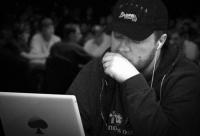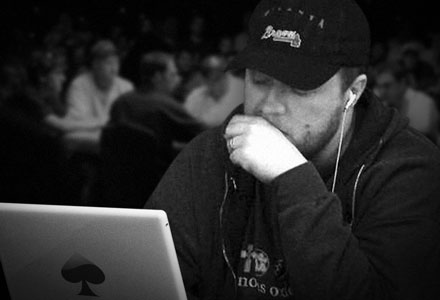 When my editor asked me to write about what my poker life has been like since Black Friday, I thought to myself, “Well, that’ll be easy.” Since the US government shut down Full Tilt and PokerStars I’ve only played in home games while on vacation.
When my editor asked me to write about what my poker life has been like since Black Friday, I thought to myself, “Well, that’ll be easy.” Since the US government shut down Full Tilt and PokerStars I’ve only played in home games while on vacation.
Before that, though, I played a lot of poker.
I’ve been a recreational poker player since 2004, when, with no previous experience, I started playing limit hold’em online after learning that was a thing people could do. (Thanks, TV!) What a revelation that was! Predictably, I was very bad at poker back then. Losing, however, irritated me, and my irritation led me to find poker books and poker blogs. In a short enough time I’d gathered enough knowledge to stop losing.
I wasn’t steadily winning yet, because I wasn’t a good poker player, but I was able to stay afloat by being just a little better than the truly terrible poker players taking up all the other seats. I eventually made back the few hundred dollars I’d lost in the beginning. I had progressed: I now had a hobby that wasn’t costing me any money.
I continued to read and play and learn about what I was finding to be a fascinating game, hoping I might actually develop some skills if I stuck with it long enough. As I worked my way up the from $.50/$1 limit hold’em tables (the smallest at the time) to $3/$6, I started writing about playing the game almost as much as I actually played. At about that time a stroke of fortune led from writing that blog to writing about other people playing poker. I kept playing poker recreationally, and poker kept paying for itself and lots of other things, too. Before UIGEA, between playing online and in the occasional live tournament, my winnings paid for a used car, a dog, several computers, and frequent traveling around the country with my wife, with whom I played a lot of low-stakes poker and met some incredible people.
After UIGEA came along my work shifted away from traveling to cover tournaments and more toward writing from home. At the time I was living in a rural area where the only high-speed internet service available came by satellite. The slow nature of the technology was just fine for sending articles to people and continue writing about poker, but frequent service timeouts made it hard to actually play the game anymore. I cashed out most of my online bankroll and left a little online to play around with if I happened to be somewhere with better internet access. My remaining account balances soon went dormant and I essentially stopped playing poker outside of the occasional home game.
I spent a few more years out there in the country, so by the time I moved to the city and had broadband available to me again I was eager to get back to playing online poker. Thrifty bankroll management, not to mention taking advantage of numerous bonuses, kept me playing on the little bit of money I had left in my accounts. I had to shake off the rust and adjust to a level of play that, even at some of the lowest stakes, was better than what I remembered from the early poker boom days. Then came Rush Poker, where all I had to do was play solid and let everyone else make mistakes. Everything changed.
Looking back, Black Friday couldn’t have come at a more disappointing time for me as a recreational player. In the months leading up to it I had gotten into a steady rhythm of playing several thousand hands of Rush Poker each week and, factoring in rakeback, turning a small but regular profit. I started dabbling in the micro-stakes Rush tournaments that Full Tilt introduced and eventually found a variety that I enjoyed, an on-demand tournament running nearly around the clock with a $1.10 buy-in and the opportunity to play up to four entries at a time. Within the first three months of the year I played more than three times as many tournaments as I had the entire previous year, with a higher cashing percentage and more final table appearances. By the middle of March my bankroll was starting to reflect the time I’d put in at the tables.
Just as I was beginning to become satisfied with my level of play and results, though, I had to take a little time off to write a magazine feature that paid a lot more than grinding micro-stakes online poker tournaments. I promised myself I’d get back to the tables once I had all my work out of the way and really push myself to start making money playing poker again. Then the government pulled the plug.
To say my poker-playing options have been limited since then would be like saying Doyle Brunson has been playing poker for a few years, or that Phil Hellmuth has blown up in front of the TV cameras once or twice. It used to be that the closest place to play was no further away than my laptop. Now I can only a handful of options. I can drive three and a half hours to southern Indiana, where there’s been a bustling regional scene for some time now. Or I could opt to take an extra hour, making the trip four and a half, and try my luck in Tunica, Mississippi. Aside from those two choices, I’d have to hop on a plane to go somewhere that has friendlier poker laws.
All of those options would require me to spend significant money on travel and lodging just to play in any of those places, and then on top of that I’d essentially be taking a shot above my bankroll any time I played since the stakes are far above. Given the steeper costs of playing live, the chances of me making a profit in my situation are pretty slim unless I have a monster session. It’s not unthinkable, but it’s pretty far from a sure bet – and one of the most appealing things to me about online poker was being able to build something from nothing by playing sure bets. I didn’t have to gamble at the table before Black Friday, but that’s exactly what I’d have to do now just to sit down at the table.
Poker changed my life, but then my government changed poker. Life kept on going for me, as it does for everyone in any circumstance, but poker wasn’t in the middle of it anymore. I’ve continued to write about the game, which is something I enjoy and I’m very glad to be able to do. But it will surprise me if I get back to the tables the way I’d planned to before Black Friday, trying to build something out of next to nothing.
